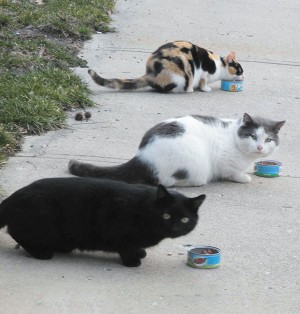The Larrys, Thomasinas, Grouchy Cats, Marmalades, and Inkys of Indianapolis have many friends — even though they may not realize it. These community cats, and thousands more, are cared for by volunteers throughout the city who love cats and believe that their lives are valuable. They are also tended to by a thirteen-year-old organization, IndyFeral, which helps educate and protect the community cat population.
Since 2002, IndyFeral staff and volunteers have worked to reduce the stray and community cat overpopulation in Central Indiana through the non-lethal method of Trap-Neuter-Return (TNR). On any given day, volunteers go out to monitor community cat colonies throughout the city. Besides feeding the cats, volunteers get to know their colonies, noting when a cat looks ill, or if a new cat has appeared. They trap and take ill cats for treatment, and return them to the colonies if they are healthy enough, and also trap newcomers to get them spayed or neutered, vaccinated, and recorded. Sometimes, they bring in cats and kittens that may be adoptable to find them homes. Many times, volunteers pay for the food and medical care out of their own pockets. Currently, there are about 35,000 community cats cared for by IndyFeral volunteers.
Cats that have been fixed and vaccinated by IndyFeral are identified by a clipped ear. If you see one of these cats strolling through the neighborhood, you can be quite certain that someone (or a group of someones) is looking out for them. Abandoned homes, sheds and garages are favored shelters for community cats, and IndyFeral also creates warm shelters from donated styrofoam boxes stuffed with straw for the cats in winter months.
IndyFeral is the FACE clinic’s community cat program, administered by Lisa Tudor. Foundation Against Companion-Animal Euthanasia, or FACE, offers low-cost spay/neuter services for cats and dogs, plus a low-cost vet medical clinic and services for low-income pet owners. Located at 1505 Massachusetts Ave., FACE has created a one-of-a-kind clinic for spay/neuter and medical care of pet dogs/cats and neighborhood cats. They offer a low-cost medical clinic (no appointment needed), plus a vaccination clinic open seven days a week, microchipping, and other wellness services. Visit facespayneuter.org for more information about their services.
Tudor started the Community Cat program when she volunteered at FACE and heard over and over again from people who wanted to help the community cats in the neighborhood, but were unable to catch them. “I looked into TNR, and we started the trapping. It took off like a shot and we’ve never looked back.”
IndyFeral was established as a means of changing the way stray and community cats have been traditionally viewed and dealt with — scooped up, kept in high-stress shelters, then often euthanized. IndyFeral’s work in fixing strays and community cats has helped dramatically reduce the number of cats going to shelters in Indianapolis, and also advocating for their humane treatment. “We only release healthy cats back into the colonies. They are fixed, vaccinated, and maintained,” Tudor said.
“Neutering and spaying cats makes them better neighbors. They become calmer, less likely to fight with other cats, and don’t exhibit mating behaviors.”
Not all neighbors are welcoming of community cat colonies, however. Sometimes, they get picked up and IndyFeral is alerted that a shelter has one of their cats. They rescue it, and bring it back to the colony. Sometimes, a colony needs to be relocated due to safety concerns or their site has been disrupted. IndyFeral runs a Barn Cat program that rehomes the cats, finding them gainful employment as mousers in rural or semi-rural settings.
Tudor noted that most of what IndyFeral does for cats in the neighborhoods is cleaning up what people have created. “I like to say we’re a safety net for cats who find themselves on the street for one reason or another. You’d be surprised how many cats we trap who are declawed, who obviously were indoor cats once, but not neutered, and kicked to the curb. They are not going to do well outdoors.” In these cases, IndyFeral traps them, then works with rescue organizations to rehome them. In addition, over time, the population in the cat colonies will begin to decline naturally.
Tudor stresses that there are many resources available for low-income people to neuter their pets. “There’s no reason a cat, or dog, shouldn’t be neutered in this city.”
For information about low coast spay/neuter services, help with community and stray cats, and how to help homeless cats, call FACE at 638-3223.



